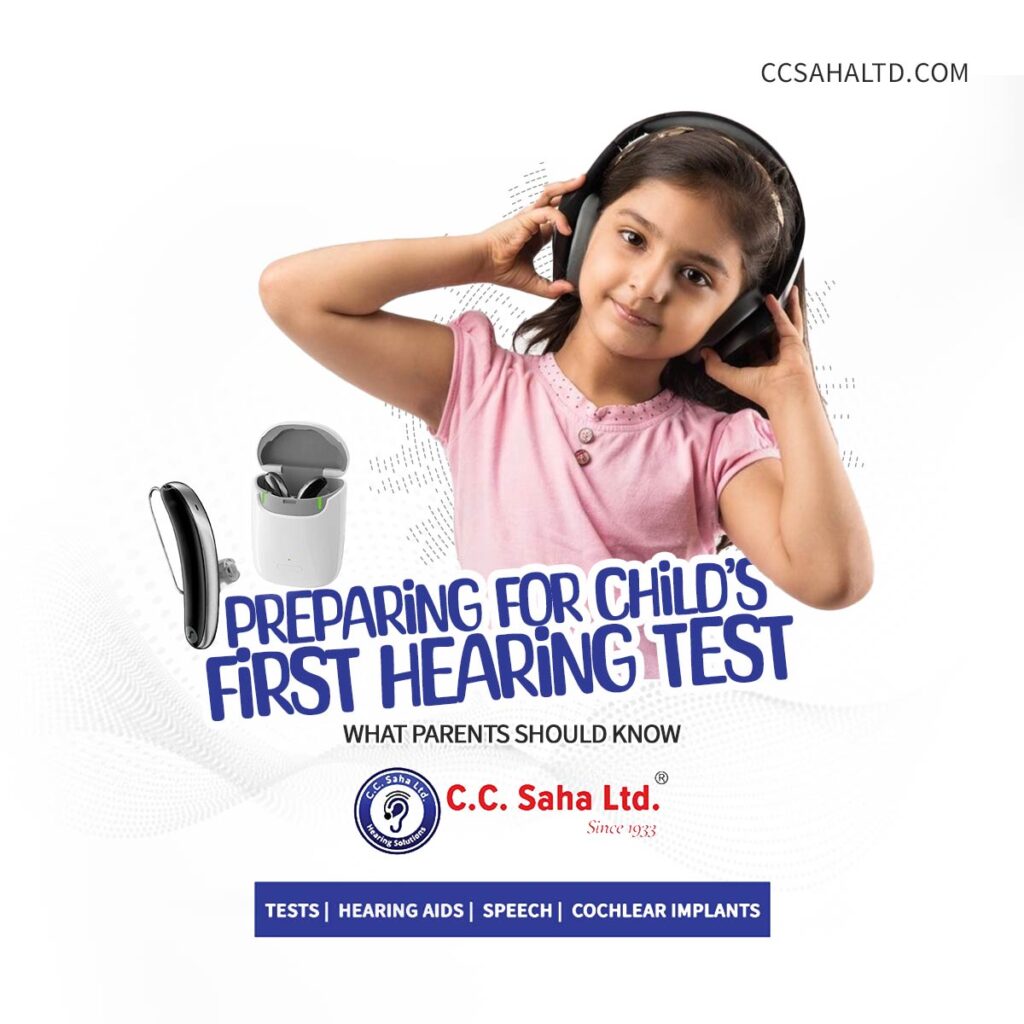
Paediatric Hearing Care
Early intervention is the key to paediatric hearing care. Learn how CC Saha Ltd. combines audiology, speech therapy, and occupational therapy for success.
Bikash, “Arrey Apurba da, what’s up?”
Apurba, “Bikash! I’m good, thanks. I want to ask you about something.”
Bikash, “Sure, please ask.”
Apurba, “Well, I think my son is having hearing issues. I’m a bit tense.”
Bikash, “Ah, don’t worry. Your child’s first hearing test shouldn’t be much of a problem. It’s painless. You know my son Abhik, right? I guess you didn’t know he had the same problem a couple of years back. I took him to CC Saha Clinic. They did some basic tests and put a hearing aid.”
Apurba, “Really? I just saw him running up the stairs and he didn’t seem to have any hearing aid.”
Bikash, “Don’t worry, mate. The hearing aids these days are so small and fit into the ears just like those mobile earpods. You really can’t make them out.”
Babies begin developing their hearing abilities even before they are born.
It’s pretty amazing right?
By the time they make their grand entrance into the world, their little ears are already quite advanced. They can hear and respond to sounds around them. But their hearing doesn’t stop evolving there, it keeps getting better as they grow up.
As your baby grows, you’ll notice the changes in their hearing development. For instance, they’ll start turning their head towards sounds, responding to their name, and eventually, learn to understand and produce speech. Each of these stages is super important for their language and communication skills.
As parents, you should be vigilant. Check if your child isn’t responding to sounds, or if their speech and language development seem to be delayed. You may feel that they even have trouble following simple instructions. If you observe any of these signs, consider having it checked out. Getting to know and addressing hearing issues early can make a big difference in your child’s development.

When preparing your child for their first hearing test, it’s important to create a positive and comfortable environment. You can do this by explaining the process in a playful way, bringing familiar items, like toys, to the appointment, and making sure your child is well-rested and fed before the test.
Some common things that you could do at home before taking your child to the audiologist:
As a parent, you should be aware what to expect during your child’s first hearing test. Have an idea about the different types of tests, such as auditory brainstem response (ABR) or otoacoustic emissions (OAE), and how they are conducted. You need to read and educate yourself about these primary tests. Please it is cardinal for you to not panic in front of your child at the clinic.
Some common tests:
Choosing the appropriate audiologist or hearing healthcare specialist is paramount for your child’s well-being. At CC Saha Clinics, our professionals boast extensive experience in working with children, possess specialized pediatric testing equipment, and maintain a family-oriented approach. It’s crucial to select an audiologist who genuinely enjoys working with children, especially considering that children with auditory impairments may already face communication challenges.
During your child’s first hearing test, the audiologist will do several assessments to evaluate their hearing. They might perform behavioural observation audiometry, where the child’s responses to sounds are observed, or objective tests like ABR or OAE. All tests are done keeping the child playful and cooperative. Slight discomfort or situational unfamiliarity may upset your child. So parents need to be at their best at distracting and pacifying their child so that the tests are done accurately.
You should check out the list of audiometry tests done on children and understand the pros and cons of each test very clearly. Better understanding will make you more confident.
Understanding the Audiogram: An audiogram is a graphical representation depicting your child’s hearing capabilities at various frequencies. Your audiologist will interpret the audiogram, aiding your comprehension of any potential hearing impairment in your child and assisting you in determining the most suitable course of treatment.
You should know what normal hearing looks like. This knowledge allows you to recognize your child’s strengths and with professional help at CC Saha Clinics you will be pointed at areas where they might need extra support.
Understanding the Audiogram: An audiogram is a graphical representation depicting your child’s hearing capabilities at various frequencies. Your audiologist will interpret the audiogram, aiding your comprehension of any potential hearing impairment in your child and assisting you in determining the most suitable course of treatment.
You should know what normal hearing looks like. This knowledge allows you to recognize your child’s strengths and with professional help at CC Saha Clinics you will be pointed at areas where they might need extra support.
If the test shows that your child’s hearing is normal, celebrate and continue to support their development. Keep monitoring their hearing health as they grow.
If the test results raise concerns, it’s important to seek further evaluation and treatment. This could involve more testing, consulting specialists, and considering options like hearing aids or therapy.
The audiologist might also suggest speech therapy or psychometric tests to gain a thorough understanding of your child’s abilities and limitations, particularly in communication skills, to help chart a clear path forward.
Minimize background noise, use visual cues and gestures to supplement communication, and talk openly with your child about their hearing needs. They must understand their limitations early, so that they can make a smooth transition into the therapy sessions and adapt to life with hearing aids or cochlear implants.
Since language development is linked to hearing, support your child’s language skills from an early age. Read books, sing songs, and engage in interactive play that promotes communication.
Should your child require hearing aids, at CC Saha Hearing Clinics there are several different models and make across price ranges to choose from. These include behind-the-ear (BTE) or Receiver-in-canal (RIC) models equipped with water resistance, Bluetooth connectivity, and noise-cancelling technologies. State-of-the-art hearing aid models from leading brands now incorporate rechargeable features, streamlining the battery replacement process for added convenience.
Ensure your child’s hearing aids provide comfort and efficacy through accurate fitting and consistent upkeep. Consider consulting with an audiologist to secure an optimal fit and acquire guidance on device maintenance for optimal performance.
Every child’s hearing journey is unique. Celebrate and embrace their individual experiences, encouraging them to be proud of who they are. You being parents must support them through the challenges and triumphs.
Assist your child in cultivating confidence, self-advocacy, and problem-solving abilities. Empower them to take proactive steps toward maintaining their hearing health and standing up for their requirements across various settings.
Keep in mind that your child’s hearing journey has just begun. Persist in monitoring their auditory health, taking care of what is necessary, and fostering their holistic well-being as they develop and flourish.
Although hearing loss poses certain limitations, it constitutes just a part of your child’s overall welfare. Dedicate your efforts to cultivating their strengths, making them confident, and aiding them in achieving their full potential across all facets of life.
At C.C. Saha Ltd., we provide a comprehensive range of hearing solutions that include the testing of a patient’s ability to detect tones at different frequencies. Our highly skilled Audiologists conduct a thorough examination, taking into account the patient’s hearing loss history, lifestyle choices, and needs, and then recommend the best possible hearing solution.
We are present across the city of Kolkata, at Esplanade, Prince Anwar Shah Road, Dunlop, Salt Lake, and Barasat. We also have clinics at Midnapore and Burdwan.

Early intervention is the key to paediatric hearing care. Learn how CC Saha Ltd. combines audiology, speech therapy, and occupational therapy for success.

As we welcome 2026, it is time to prioritize ear health. Explore our guide on making impactful hearing resolutions for the New Year, from annual testing to upgrading your devices.

At CC Saha Ltd., excellence in hearing care meets a legacy of compassion and expertise. As the best hearing aid centre in Kolkata since 1933, the brand continues to make hearing comfortable, easy, and life-changing for every generation.

CC Saha Ltd delivers the best cochlear implants in Kolkata and Eastern India, specializing in various types and guiding patients through every stage of the cochlear implant journey.

Early detection of hearing loss can define a child’s ability to communicate, learn, and connect with the world. Paediatric hearing tests are designed to identify hearing challenges at the earliest stages, often before a parent even notices a concern. From new-born OAE and ABR screenings to playful conditioned audiometry in toddlers, these specialized tests ensure accurate results in a child-friendly way.

The benefits of hearing aids go far beyond better hearing—they transform lives by improving communication, emotional health, and cognitive vitality. From reconnecting with loved ones to regaining confidence in social and professional settings, hearing aids restore the joy of sound in every moment. With advanced technology that adapts to individual environments, they offer clarity, comfort, and control. Discover how embracing modern hearing solutions through CC Saha Ltd. can help you experience the life-changing benefits of hearing aids today.
#ChildsFirstHearingTest #FirstHearingTest #HearingHealth #ParentingTips #ChildDevelopment #EarlyIntervention #AudiologistConsultation #HearingMilestones #SupportingYourChild #ParentingJourney #HealthyHearing #KidsHealth #FamilyWellness #ChildCare #Parenting101 #CCSahaInsights #CCSaha #HearingClinic

